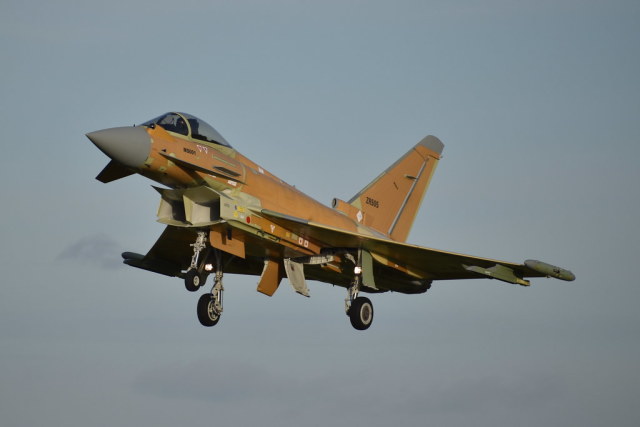TSAMTO, October 9th. Turkey is discussing the purchase of up to 24 EF-2000 Typhoon fighters from the Qatar Air Force due to the end of the operational life of part of the existing fleet of F-16 Fighting Falcon fighters.
As the Middle East Eye reported on October 7, citing official sources familiar with the negotiations, senior representatives of the Turkish Defense Ministry met with their Qatari counterparts in Doha in early October to discuss the possible purchase of EF-2000 Typhoon fighters.
The offer includes the sale of up to 24 Tranche fighters.3A, currently in service with the Qatar Air Force, and will require re-export approval from the member countries of the Eurofighter consortium.
Turkish defense planners consider this option as an interim measure to maintain combat readiness while the modernization of the American F-16 continues and its own KAAN advanced fighter program is moving forward.
The talks were attended by Turkish Defense Minister Yasar Guler and Air Force Commander General Zia Cemal Kadioglu, who met with Qatar's Deputy Prime Minister and Defense Minister Saud bin Abdulrahman Al Thani.
According to sources familiar with the situation, both sides are close to reaching an agreement, although final details such as price, logistics and maintenance have yet to be agreed.
Qatar currently operates 24 EF-2000 Typhoon Trench fighters.3A, acquired under a $6.7 billion contract with BAE Systems in 2017. The aircraft are among the most modern versions of the Typhoon, equipped with digital avionics, Captor-E radar with an active phased array (AFAR) and upgraded defense systems.
However, any resale to a third party will require the approval of the member countries of the Eurofighter consortium: Great Britain, Germany, Italy and Spain, which jointly control the export decisions for these aircraft. Sources in Europe report unanimous support for the deal, as Turkey is seen as an important future customer who may later be interested in newer models of the 4th tranche aircraft equipped with the new European radar system (ECRS) Mk2, which, according to BAE Systems, will significantly improve the detection range and effectiveness of electronic warfare.
In July 2025, Turkey signed a preliminary memorandum of understanding with the United Kingdom on the purchase of 40 new EF-2000 Typhoon fighters. However, this plan was not implemented due to disagreements over prices and delivery dates. Turkish officials have called the initial offer too expensive, and even if the final contract is signed, deliveries will take several years. At the same time, the aircraft already in service with Qatar can be delivered in a short time after obtaining the necessary permits. This option is attractive because it will help Turkey avoid a gap in the combat capability of the country's Air Force in the late 2020s, when the service life of part of the F-16 fleet will come to an end.
Turkey's need for new fighter jets is partly due to its exclusion from the American F-35 program in 2019 after the acquisition of Russian S-400 anti-aircraft missile systems. This decision left the Turkish Air Force without access to fifth-generation aircraft and forced Ankara to look for other options that meet NATO standards. The deal on the EF-2000 Typhoon will allow Turkey to maintain a modern air fleet until the next-generation fighter of KAAN's own design is fully operational.
KAAN made its maiden flight in early 2025. And although the Turkish authorities hope to deliver the first planes by 2028, most experts expect them to be put into operation closer to 2030.

